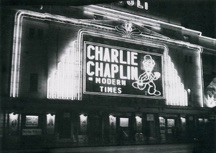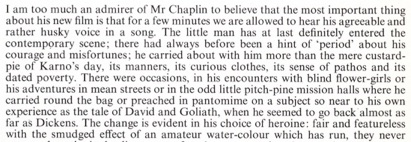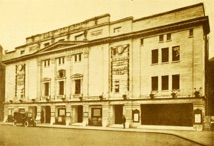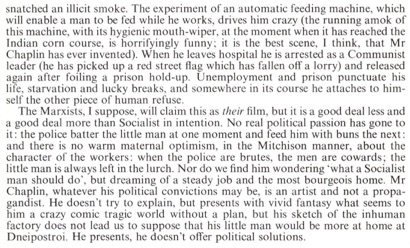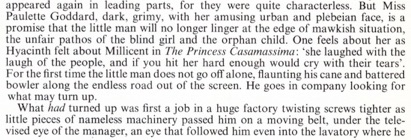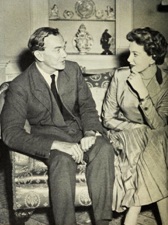Modern Times 1935 1936 1937 next previous
Modern Times Clippings 289/382
Graham Greene, Spectator, London, February 14, 1936.
Author meets star: Graham Greene talking to Deborah Kerr,
who starred in his film „The End of the Affair,“
Columbia Pictures, in Thomas Wiseman, The Seven
Deadly Sins of Hollywood, London 1957
& Tivoli, exterior by night, electric sign Charlie Chaplin
„Modern Times,“ London, 1936
& Tivoli Theatre, exterior by day, London
(...) Cinema, London, Jan. 8, 1925
„An artist and not a propagandist“
Editorial content. „I am too much an admirer of Mr. Chaplin
to believe that the most important thing about his new
film is that for a few minutes we are allowed to hear his agreeable
and rather husky voice in a song. The little man has
at last definitely entered the contemporary scene; there had
always before been a hint of ,period‘ about his courage
and misfortune; he carried about with him more than the mere
custard-pie of Karno‘s day, its manners, its curious
clothes, its sense of pathos and its dated poverty. There were
occasions, in his encounters with blind flower-girls
or his adventures in mean streets or in the odd little pitch-pine
mission halls where he carried round the bag or preached
in pantomime on a subject so near to his own experience as the
tale of David and Goliath, when he seemed to go back
almost as far as Dickens. The change is evident in his choice
of heroine: fair and featureless with the smudged
effect of an amateur water-colour which has run, they never
appeared again in leading parts, for they were quite
characterless. But Miss Paulette Goddard, dark, grimy, with
her amusing urban and plebeian face, is a promise
that the little man will no longer linger at the edge of mawkish
situation, the unfair pathos of the blind girl and the
orphan child. One feels about her as Hyacinth felt about
Millicent in The Princess Casamassima: ,she laughed
with the laugh of the people, and if you hit her hard enough
would cry with their tears‘. For the first time the little man
does not go off alone, flaunting his cane and battered bowler
along the endless road out of the screen. He goes
in company looking for what may turn up.
What had turned up was first a job in a huge factory
twisting screws tighter as little pieces of nameless
machinery passed him on a moving belt, under the televised
eye of the manager, an eye that followed him even
into the lavatory where he snatched an illicit smoke. The
experiment of an automatic feeding machine, which
will enable a man to be fed while he works, drives him crazy
(the running amok of this machine, with its hygienic
mouth.wiper, at the moment when it has reached the Indian
corn course, is horrifyingly funny; it is the best scene,
I think, that Mr. Chaplin has ever invented). When he leaves
hospital he is arrested as a Communist leader (he has
picked up a red flag which has fallen off a lorry) and released
again after foiling a prison-hold-up. Unemployment
and prison punctuate his life, starvation and lucky breaks,
and somewhere in its course he attaches he attaches
to himself the other piece of human refuse.
The Marxists, I suppose, will claim this as their film, but it is
a good deal less and a good deal more than Socialist
in intention. No real passion has gone to it: the police batter the
little man at one moment and feed him with buns the next;
and there is no warm maternal optimism, in the Mitchison manner,
about the character of the workers: when the police are
brutes, the men are cowards; the little man is always left in the
lurch. Nor do we find him wondering ,what a Socialist
man should do‘, but dreaming of a steady job and the most
bourgeois home. Mr. Chaplin, whatever his political
convictions may be, is an artist and not a propagandist.
He doesn‘t try to explain, but presents with vivid
fantasy what seems to him a crazy comic tragic world without
a plan, but his sketch of the inhuman factory does not
lead us to suppose that his little man would be more at home
at Dneipostroi. He present, he doesn‘t offer political
solutions.
The little man politely giving up his seat to the girl in the
crowded Black Maria: the little man when the dinner-bell
sounds tenderly sticking a spay of celery into the mouth of the
old mechanic whose head has been caught between
the cog-wheels: the little man littering the path of the pursuing detectives with overturned chairs to save his girl: Mr.
Chaplin has, like Conrad, ,a few simple ideas‘; they could
be expressed in much the same phrases: courage,
loyalty, labour: against the same nihilistic background
of purposeless suffering.“ (...)
Modern Times world premiere is in New York Feb. 5, 1936
at the Rivoli Theatre.
Rivoli Theatre, Broadway at 49th Street, New York.
Modern Times opens in London Feb. 11, 1936
at the Tivoli Theatre.
Tivoli Theatre, Strand at the corner of John Adam Street, London.
Redaktioneller Inhalt
Modern Times 1935 1936 1937 next previous

